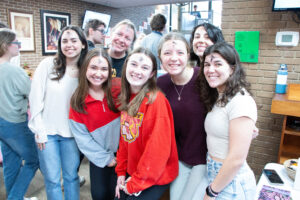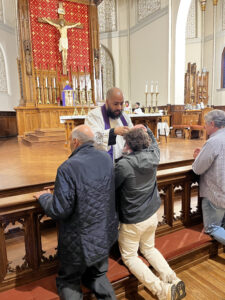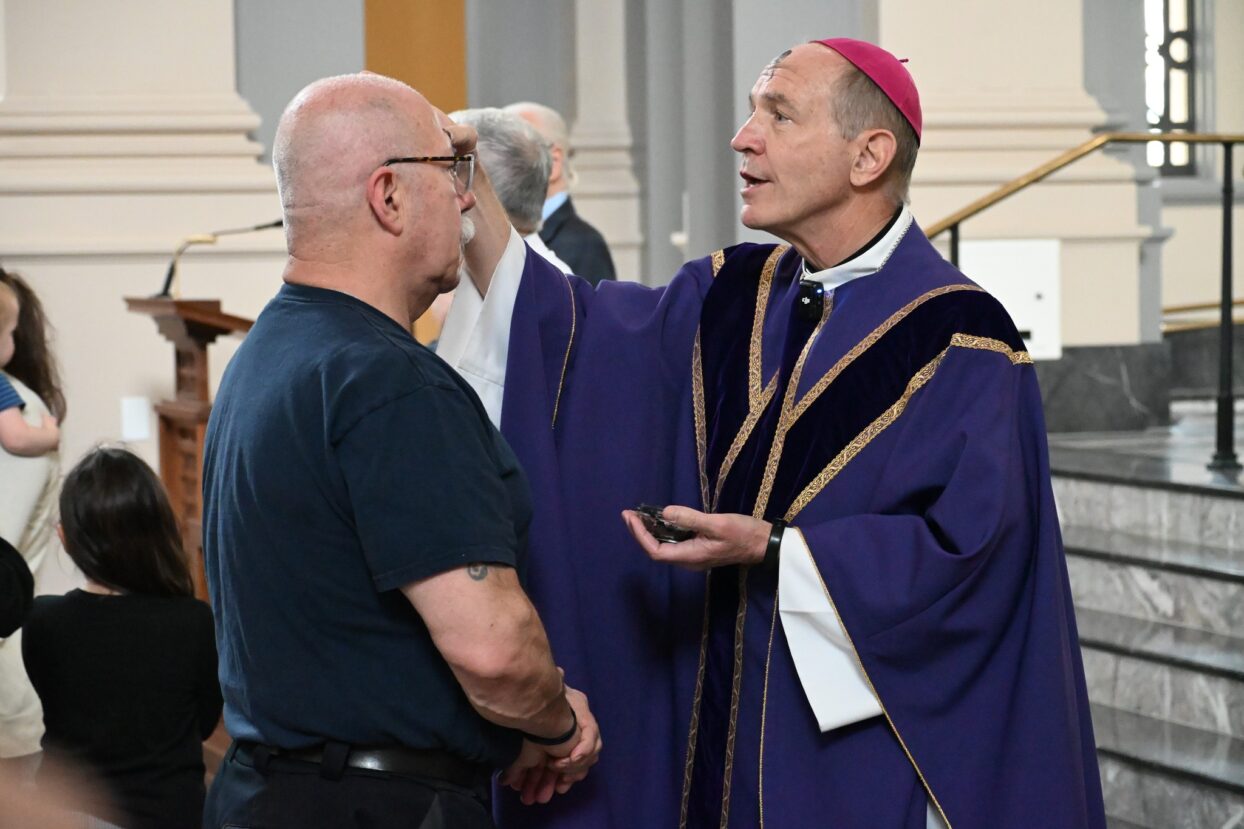Parishes see strong attendance at Ash Wednesday Masses as Lent begins
The East Tennessee Catholic
Catholics ushered in Lent on Ash Wednesday at churches across East Tennessee as they begin their annual journey to Easter, April 19-20.
Faithful of all ages received their ashen crosses that signify Christ’s Passion and resurrection during Masses throughout the day on March 5.
Bishop Mark Beckman celebrated Ash Wednesday Mass at the Cathedral of the Most Sacred Heart of Jesus, where a standing-room-only congregation assembled for the noon service.
The bishop placed ashes on foreheads in a celebration that could be seen in churches around the Diocese of Knoxville led by the diocese’s priests.

University of Tennessee-Knoxville students show off their ashes following Ash Wednesday Mass at St. John XXIII Catholic Center. (Photo Bill Brewer)
Ash Wednesday, which began the 40-day period of fasting, prayer, and penance leading to Easter, is not a holy day of obligation, but it is considered a holy day of invitation. Non-Catholics also can receive ashes in this annual celebration.
“I have always found the day of Ash Wednesday to be one of the most powerful days of the year as a Catholic. Don’t you agree?” Bishop Beckman asked to begin his homily.
“Something draws us back to the Church on this day, sometimes above all others. And for me, one of the most powerful moments is that moment when we mark the foreheads in ashes with the sign of the cross. Remember that you are dust, and to dust you will return,” the bishop continued.
Every church in the diocese collected the charcoal-like remains of burned palms that were blessed from previous Palm Sundays for this season’s ashes.
“As a priest, marking foreheads with that symbol and those words has always been profoundly moving and humbling. And yet, the first moment when our foreheads are marked with the sign of the cross is not with ashes. When someone is brought to the font of baptism, marked with sacred chrism at that moment, with the sign of the cross, we are claimed by God as beloved daughters, beloved sons of God,” Bishop Beckman shared.
“Today, when you receive my mark of the ashes on your forehead, your Father is calling you home again. He’s reminding you that you belong with Him. You are a beloved son or daughter. He’s been waiting for you. So, whatever in your life has held you back from Him, He’s asking you today to let go of it.
“Let God remove the obstacles that hold you back from Him today. Remember who you are, that you belong to God. And once we know this great mystery, what happens to us? We’re drawn into Lent with a deeper sense of prayer. We want to go to our Father, to speak to Him, to listen, to be awakened day by day during these days of Lent,” Bishop Beckman advised.
He reflected on the foundation of Lent: prayer, sacrifice, and doing something for others.
“We want to give up extraneous things in life, that extra stuff that doesn’t really fulfill the human heart. That is what fasting is about. And we want to become, more profoundly, givers of love for one another. That is the mystery behind almsgiving,” he concluded.
He urged the congregation to remember that they are beloved daughters and sons of God. “And the Father is inviting you home today.”
University of Tennessee-Knoxville students poured into St. John XXIII Catholic Center, where they filled every seat, lined the walls, and even filled the campus building outside of the large room where Mass was celebrated.
The students were receptive to the homily given by Father Bob O’Donnell, CSP, just before they lined up to receive their ashes.
Father O’Donnell may have surprised them when he opened with a pop quiz.
“Where do babies come from? This is possibly children’s most-asked question. Where do these ashes come from? That may be the least-asked question by any of us. Ultimately, they come from the burning of palms from past Palm Sunday celebrations,” the Paulist priest answered.
“The palms of victory and glory that welcomed Jesus that day soon turned to the seeming ashes of Good Friday with His crucifixion. It’s a good reminder, with ashes in the form of a cross, that our salvation springs not from our own efforts but from Christ’s saving cross and resurrection, the fullness of God’s love offered to us,” Father O’Donnell said.

Parishioners at the Basilica of Sts. Peter and Paul in Chattanooga kneel at the Communion rail to receive ashes from Father Alex Hernandez. (Photo Claire Collins)
“If the sacrifice of the cross—self-giving of Jesus—offers that forgiving love, then it is our self-giving, to the Lord and one another, that opens us to receive that healing mercy and love. Our sacrifice can take many forms as proclaimed in today’s Scripture,” he added.
Father O’Donnell, who is in senior ministry at St. John XXIII, advised the students to engage in fasting and other ways of self-denial, prayer, and generosity to make their Lenten journey fulfilling.
“‘Giving up’ something breaks through our self-indulgence and self-satisfaction and points to other challenges: to give up back-biting, untruthful boasting, and racist comments. More intense prayer removes our armor of self-sufficiency. We need God. And almsgiving, generosity in any form, leads us away from possessiveness and self-centeredness,” he said. “And there is much else that we can give or give up: give time to listen to a friend in distress; give help and service. Literally clean up where we live; give up excess consumerism.”
Father Larry Rice, CSP, pastor of St. John XXIII, is greatly encouraged by the Mass attendance on Ash Wednesday at St. John XXIII. He said the other Masses on March 5 were equally as full, if not more crowded, than the noon Mass.
“It’s pretty amazing. And this is what we see very consistently, year after year. People want to be here on Ash Wednesday. They want to be marked as a faithful Catholic Christian. They want a start to their Lent. This is how they do it. On the other major holidays—Christmas and Easter—the students are all at home,” Father Rice explained.
“This is a Wednesday, and they are all in school, and they are all here. So, we get huge, huge crowds. We may see 1,500 or 2,000 people come through here today. And it is not a holy day of obligation,” he added.
Father Rice noted that if someone witnessed the Masses at St. John XXIII on Ash Wednesday, they would disagree that young people are falling away from the Church.
“We see a lot of really great young adults here who are serious about their faith and I think who see Ash Wednesday as an opportunity for them to recharge and restart. We are happy to have them here. We have all kinds of resources to help them with their Lenten observance. This is a great and energizing place to be on Ash Wednesday,” Father Rice said about the young congregation.
As the students left St. John XXIII after Mass to return to class and their activities on campus, they were comforted by the closing remark in Father O’Donnell’s homily. “As we are marked with ashes in the sign of the cross, we trust that God will lead us through Christ to resurrection and new life.”
During this Lenten season, Bishop Beckman presided at the diocesan Rite of Election on March 8 at the cathedral. Individuals taking part in the Order of Christian Initiation for Adults from the four deaneries took part in the service.
The rite is an important step in OCIA, which is the formal process of evangelization and catechetical instruction, prayer, and liturgies where adults, or catechumens, are formally admitted into the Church and receive the sacraments of initiation: baptism, confirmation, and Holy Eucharist. Individuals in OCIA who previously have been baptized also take part in the process and are called candidates.
During the course of the OCIA program, the individual follows a spiritual journey of “steps” accomplished through defined periods punctuated with formal rites. The Rite of Election closes the period of the catechumenate, which typically coincides with the first Sunday of Lent.
At this rite, upon the testimony of sponsors and catechists and the catechumens’ affirmation of their intention to join the Church, the Church makes its “election” of these catechumens and candidates to receive the sacraments of initiation.
Holy Week will be observed beginning with Palm Sunday on April 13. The Chrism Mass will take place on Tuesday, April 15, at 7 p.m., followed by Holy Thursday on April 17, and Good Friday on April 18.
Bishop Beckman will celebrate the Easter Vigil Mass on Saturday, April 19, at the cathedral beginning at dusk. During Easter Vigil, the bishop will administer the sacraments to the catechumens and candidates entering the Church.
The Diocese of Knoxville’s 51 parishes and mission church, as well as its Chattanooga public association, are also planning Holy Week and Easter observances.
The sacrament of reconciliation is central to the Lenten season and is available at every church. Lenten penance services are being offered in each of the four deaneries.
The seven-week Easter season, or Eastertide, that begins on April 19 includes the feast of the Ascension 40 days after Easter and concludes on the 50th day of Eastertide with Pentecost Sunday.

